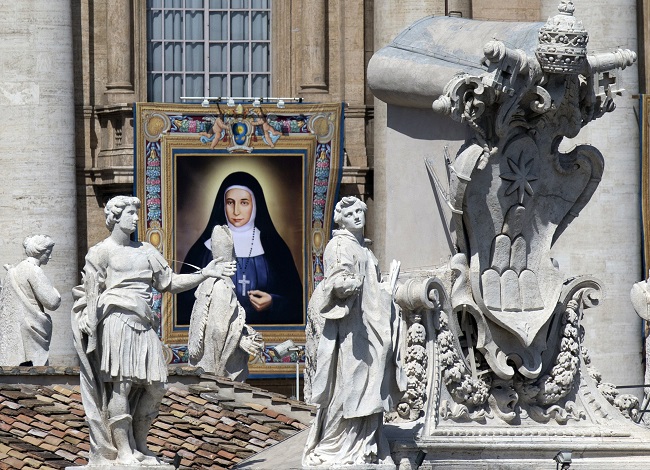
A tapestry showing St. Marie Alphonsine Ghattas hangs from a balcony of St. Peter’s Basilica at the Vatican, Sunday, May 17, 2015. Pope Francis canonized two nuns from what was 19th century Palestine on Sunday in hopes of encouraging Christians across the Middle East who are facing a wave of persecution from Islamic extremists. Sisters Mariam Bawardy and Marie Alphonsine Ghattas were among four sisters who were made saints Sunday at a Mass in a sun-soaked St. Peter’s Square. AP
VATICAN CITY— Pope Francis canonized two nuns from what was 19th century Palestine on Sunday in hopes of encouraging Christians across the Middle East who are facing a wave of persecution from Islamic extremists.
Sisters Mariam Bawardy and Marie Alphonsine Ghattas were among four sisters who were made saints Sunday at a Mass in a sun-soaked St. Peter’s Square. Palestinian President Mahmoud Abbas and an estimated 2,000 pilgrims from the region, some waving Palestinian flags, were on hand for the canonization of the first saints from the Holy Land since the early years of Christianity.
Church officials are holding up the new saints as a sign of hope and encouragement for Christians across the Mideast at a time when violent persecution and discrimination have driven many of them from the region of Christ’s birth.
In his homily, Francis said the two women — as well as new saints Jeanne Emilie de Villeneuve from France and Maria Cristina of the Immaculate Conception from Italy — were models of showing unity and charity toward all.
“Their luminous example challenges us in our lives as Christians,” he said.
Bawardy was a mystic born in 1843 in the village of Ibilin in what is now the Galilee region of northern Israel. She is said to have received the “stigmata” — bleeding wounds like those that Jesus Christ suffered on the cross — and died at the age of 33 in the West Bank town of Bethlehem, where she founded a Carmelite order monastery that still exists.
Ghattas, born in Jerusalem in 1847, opened girls’ schools, fought female illiteracy, and co-founded the Congregation of the Sisters of the Rosary. The order today boasts dozens of centers all over the Middle East, from Egypt to Syria, that operate kindergartens, homes for the elderly, medical clinics and guest houses.
Francis praised Bawardy as having been “a means of encounter and fellowship with the Muslim world,” while Ghattas “shows us the importance of becoming responsible for one another, of living lives of service to one another.”
In addition to the Palestinian delegation on hand for the Mass, Israel sent a delegation headed by its ambassador to the Holy See. France, Italy and Jordan also sent official delegations.
Christians make up less than 2 percent of the population of Israel and the Palestinian territories — the birthplace of Christianity. Although Christians have not experienced the violent persecution that has decimated Christian communities elsewhere in the region, the population has gradually shrunk over the decades as Christians have fled conflict or sought better opportunities abroad.
Francis has raised the plight of Mideast Christians as a cause for concern, denouncing how the Islamic State group has violently driven thousands of religious minorities from their homes in Syria and Iraq.

